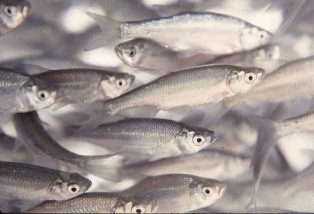Dr. Rebecca Lochmann, Professor, University of Arkansas at Pine Bluff

Fish need energy to maintain basic metabolic activities and to support growth, reproduction, activity, and health. Proteins, carbohydrates, and lipids (the macronutrients) provide this energy and also some essential nutrients. Micronutrients (vitamins and minerals) do not contain calories but are also required for good performance.
Fish require essential amino acids in proteins for growth, tissue repair, general health, and reproduction. Protein quality affects fish performance. The amount and types of amino acids in a protein source determine its quality. Some protein sources like fish meal are high quality but also very expensive. Less expensive protein sources may be used if they meet the essential amino requirements of the fish.
Lipids are energy-dense and contain essential fatty acids (n-3 and n-6 types) and fat-soluble vitamins (A, D, E, and K) that fish require for normal growth, health, and reproduction. Crustaceans, mollusks, and sometimes young fish also require phospholipids (such as soybean lecithin). Fatty acid requirements differ by species: herbivorous and omnivorous fish can usually perform well on plant oils (that have shorter-chain fatty acids), but carnivorous species often need longer-chain fatty acids (such as those found in marine fish oil).
Unlike proteins and lipids, carbohydrates do not contain essential nutrients, but they are a cheap energy source. Carbohydrates such as starch are also needed to produce floating pellets because they expand during extrusion (“cooking”).
Vitamins are organic compounds required in small amounts for normal growth, health, and function, and minerals are inorganic substances that are needed for the same purposes.
Requirements for most nutrients vary with fish species, age, size, and physiological state (e.g., stress, reproductive status).
Fish Nutrition Publications
Principles of Nutrition in Aquaculture (pdf).
Evaluation of Artificial Diets for Cultured Fish (pdf).
Mycotoxins in Aquaculture Feeds (pdf)
Phytoplankton Culture for Aquaculture Feed (pdf)
